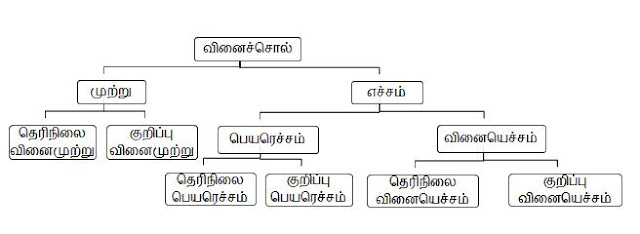காலம் (Tense)
தொழில் நிகழ்ச்சியின் நிலையை உணர்த்துவது காலம் எனப்படும்.
தமிழின் காலங்கள் இடைநிலைகளாலும், அவற்றின் விகுதிகளாலும் மற்றும் அவற்றின் பகுதிகளை மாற்றுவதன் மூலம் குறிக்கப்படுகின்றன.
இறந்தகாலம் (Past tense), நிகழ்காலம் (Present Tense) மற்றும் எதிர்காலம்(Future tense) என மூவகைப்படும்..
The tenses of Tamil are marked by medial particles or by their terminations or by change of their roots. There are three tenses.
இறந்தகாலம் (Past Tense) :
நிகழ்ச்சி நடந்துவிட்டதாக உணர்த்துவது இறந்தகாலம். த், ட் , ற், இன் இறந்த கால இடைநிலைகள்.
| வினை | பகுதி | இடைநிலை | விகுதி |
| செய்தேன் did |
செய் | த் | ஏன் |
| கண்டோம் found |
காண் | ட் | ஓம் |
| நின்றாய் stood |
நில் | ற் | ஆய் |
| ஓடினார் ran |
ஓடு | இன் | ஆர் |
இடைநிலை விகுதியோடு பொருந்தி நிற்கும் அப்போது பகுதி முதலியவற்றில் மாறுதல்கள் நேரிடலாம்.
வினைச்சொற்களின் பகுதிகள் கு, டு று என்ற எழுத்தில் முடிந்து அதற்கு முன் ஒரு குறுகிய எழுத்து மட்டுமே, வந்த, சில வினைச்சொல்லின் கடைசி எழுத்தின் மெய் (த், ட், ற்)இரட்டிப்பாகும்.
Of verbs whose roots end in கு, டு று, preceded by a single short letter only, some form the pretertite (The preterite is a grammatical tense or verb form serving to denote events that took place or were completed in the past.) by taking the tense sign (த், ட், ற்), some by doubling the consonant in the last syllable of the verb.
எடு → எடுத்தேன் (took)
நடு → நட்டேன் (planted)
பெறு → பெற்றேன் (got)
நிகழ்காலம்(Present Tense):
இது இப்போது நடக்கும் காலத்தைக் குறிக்கும். இதன் இடைநிலைகள் கிறு, கின்று.
எ. க. : வருகிறான், வருகின்றான்
எதிர்காலம் (Future tense):
வருங்காலம்; இனி நடப்பதைக் குறிக்கும் ; இதன் இடைநிலைகள் ப் வ்
எ. க. : படிப்பான் (will study), வருவான் (will come)


No comments:
Post a Comment